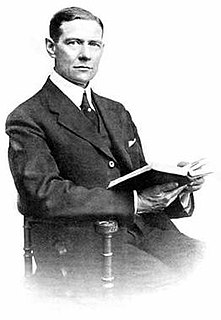A Quote by David Hume
When I think of God, when I think of him as existent, and when I believe him to be existent, my idea of him neither increases nordiminishes. But as it is certain there is a great difference betwixt the simple conception of the existence of an object, and the belief of it, and as this difference lies not in the parts or composition of the idea which we conceive; it follows, that it must lie in the manner in which we conceive it.
Related Quotes
Nothing is demonstrable, unless the contrary implies a contradiction. Nothing, that is distinctly conceivable, implies a contradiction. Whatever we conceive as existent, we can also conceive as non-existent. There is no being, therefore, whose non-existence implies a contradiction. Consequently there is no being, whose existence is demonstrable.
The prevailing idea seems to be, that I come to God and ask Him for something that I want, and that I expect Him to give me that which I have asked. But this is a most dishonouring and degrading conception. The popular belief reduces God to a servant, our servant: doing our bidding, performing our pleasure, granting our desires. No, prayer is a coming to God, telling Him my need, committing my way unto the Lord, and leaving Him to deal with it as seemeth Him best.
If we believe in a God at all, we must surely ascribe to him perfection of wisdom and perfection of goodness; we are then forced to conceive of Him - however strange it may sound to those who believe, not only without seeing but also without thinking - as without will, because He must always necessarily pursue the course which is wisest and best.
Paul indeed wanted to reveal the unknown God to the philosophers and then affirms of Him, that no human intellect can conceive Him. Therefore, God is revealed therein, that one knows that every intellect is too small to make itself a figuration or concept of Him. However, he names him God, or in Greek, theos.
So many things which once had distressed or revolted him — the speeches and pronouncements of the learned, their assertions and their prohibitions, their refusal to allow the universe to move — all seemed to him now merely ridiculous, non-existent, compared with the majestic reality, the flood of energy, which now revealed itself to him: omnipresent, unalterable in its truth, relentless in its development, untouchable in its serenity, maternal and unfailing in its protectiveness.
The only idea man can affix to the name of God, is that of a first cause, the cause of all things. And, incomprehensibly difficult as it is for a man to conceive what a first cause is, he arrives at the belief of it, from the tenfold greater difficulty of disbelieving it. It is difficult beyond description to conceive that space can have no end; but it is more difficult to conceive an end. It is difficult beyond the power of man to conceive an eternal duration of what we call time; but it is more impossible to conceive a time when there shall be no time.
If, therefore, man has come into the world to search for God and, if he has found Him, to adhere to Him and to find repose in adhering to Him-man cannot search for Him and attain Him in this sensible and corporeal world, since God is spirit rather than body, and cannot be attained in intellectual abstraction, since one is able to conceive nothing similar to God, as he asserts-how can one, therefore, search for Him in order to find Him?
God is intelligent; but in what manner? Man is intelligent by the act of reasoning, but the supreme intelligence lies under no necessity to reason. He requires neither premise nor consequences; nor even the simple form of a proposition. His knowledge is purely intuitive. He beholds equally what is and what will be. All truths are to Him as one idea, as all places are but one point, and all times one moment.
The essential difference between that knowledge which is, and that which is not conclusive evidence of Christian character, lies in this: the object of the one is the agreement of the several parts of a theological proposition; the object of the other is moral beauty, the intrinsic loveliness of God and Divine things. The sinner sees and hates; the saint sees and loves.
Every man feels that perception gives him an invincible belief of the existence of that which he perceives; and that this belief is not the effect of reasoning, but the immediate consequence of perception. When philosophers have wearied themselves and their readers with their speculations upon this subject, they can neither strengthen this belief, nor weaken it; nor can they shew how it is produced. It puts the philosopher and the peasant upon a level; and neither of them can give any other reason for believing his senses, than that he finds it impossible for him to do otherwise.
What is the result of our investigation of the Moslem idea of God? Is the statement of the Koran true, "Your God and our God is the same"? In as far as Moslems are monotheists and in as far as Allah has many of the attributes of Jehovah we cannot put Him with the false gods. But neither can there be any doubt that Mohammed's conception of God is inadequate, incomplete, barren and grievously distorted. It is vastly inferior to the Christian idea of the Godhead and also inferior to the Old Testament idea of God.






































